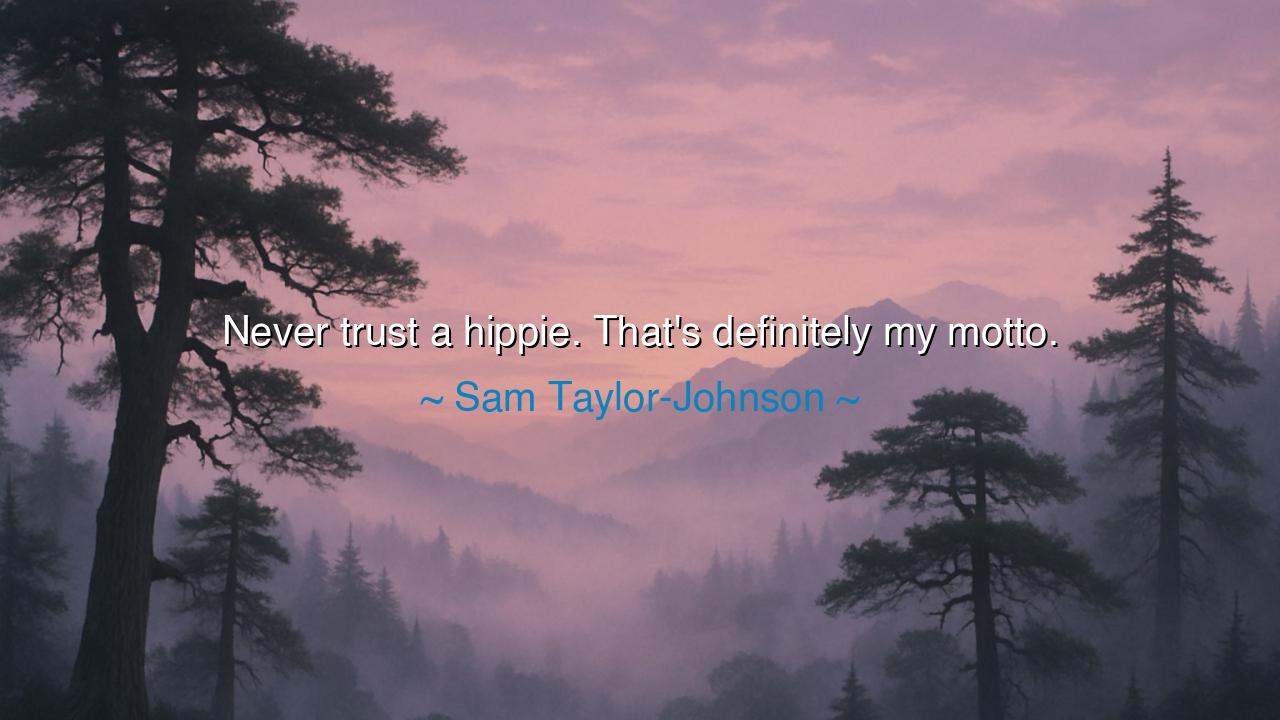
Never trust a hippie. That's definitely my motto.






Hear the playful yet piercing words of Sam Taylor-Johnson, who once declared: “Never trust a hippie. That’s definitely my motto.” At first, these words strike the ear with humor, as if they were a jest against a generation known for its rebellion, its flowers, its songs of freedom. Yet beneath the wit lies a deeper wisdom about appearances, about authenticity, and about the danger of trusting masks rather than hearts. For the hippie, in her saying, is not merely a figure of long hair and bright colors, but a symbol of ideals that can sometimes drift into illusion, promises that charm but may not endure.
The origin of this saying rests in Taylor-Johnson’s own world as an artist, a filmmaker, and a woman who has navigated the dazzling and deceptive paths of culture. To say “never trust a hippie” is not to condemn the longing for peace or freedom, but to caution against those who wear ideals like costumes rather than living them in truth. Words of peace are easy; living with integrity is hard. The warning is ancient: beware the one who preaches loudly but lives shallowly, whose rebellion is a pose and not a conviction.
History bears witness to this truth. In the late 1960s, the hippie movement arose in America and beyond, proclaiming love, freedom, and peace. Yet while many were sincere, others clothed themselves in its language for self-indulgence, drifting into excess, addiction, and chaos. The dream of Woodstock was beautiful, yet the violence of Altamont soon followed, revealing the cracks in the vision. It is not that love and peace were false, but that some who carried those banners did not carry them with the weight of responsibility. Thus Taylor-Johnson’s words stand as a reminder: do not trust the mask of virtue without the substance beneath.
Consider also the lessons of revolutionaries throughout time. The French Revolution began with cries of liberty and equality, yet soon those words were drowned in blood by men who proclaimed virtue while practicing terror. They were, in essence, the “hippies” of their age—speaking of freedom while concealing the lust for power. Their downfall shows the same truth: ideals alone are not enough; they must be lived with discipline, justice, and sincerity.
And yet, Taylor-Johnson’s words are not bitter—they are edged with humor. The saying “never trust a hippie” is a shield of wisdom, a reminder to smile even as we discern. It is not a call to cynicism, but to vigilance. Do not despise ideals, but test them. Do not hate the dreamer, but measure the dream against the deeds. For trust is too sacred to be given to anyone who has not proven themselves with consistency and truth.
The lesson is clear: in life, do not be seduced by appearances, no matter how beautiful, rebellious, or noble they seem. Look instead to the actions behind the words, the integrity behind the image. Whether in art, in politics, or in love, trust not the costume but the character, not the posture but the practice. In this way, you guard yourself against disappointment, and you learn to place your faith wisely.
Therefore, remember Taylor-Johnson’s jesting yet serious motto: “Never trust a hippie.” Let it remind you that truth must be tested, that words must be weighed, that appearances must be examined. Honor those whose deeds match their ideals, but withhold trust from those who only sing of peace while sowing chaos. And above all, strive yourself to be one whose life needs no mask, whose integrity shines brighter than any costume, and whose actions make your words ring true.
–––






TBNguyen Trong Binh
This quote feels like a tongue-in-cheek comment, but I’m not sure if it’s something I fully agree with. Is it fair to label an entire group of people as untrustworthy because of their lifestyle choices? Is this a form of humor, or does it reflect a deeper skepticism? I’ve always thought that trust should be earned based on personal interactions, not on someone’s appearance or how they choose to live their life.
Ttu
I find this quote a little surprising coming from Sam Taylor-Johnson. It seems like a blanket statement that could perpetuate unnecessary stereotypes. Are we supposed to distrust someone just because of their lifestyle or appearance? It makes me question how we judge people—shouldn’t we evaluate individuals based on their actions rather than broad labels? I’m all for free-spiritedness, but should it lead to distrust of people altogether?
DPVo Dai Phu
This quote is a bit provocative, but I’m curious why Sam Taylor-Johnson would say something like this. Is it just humor, or does it reflect deeper feelings about people who reject mainstream values? Can we trust people who have alternative lifestyles, or is it just a matter of personal judgment? I feel like generalizing like this can be harmful, but I’m wondering if it’s more of a personal motto than something to be taken literally.
MNDai Minh Nhat
This quote seems to play into a stereotype about hippies, and I can’t help but feel it’s a bit unfair. It’s easy to laugh at generalizations, but I wonder—what experiences led to such a strong opinion? Are hippies really less trustworthy, or is there more to it? It makes me think about how we often judge people based on superficial traits or lifestyles, without knowing the full story.
UGUser Google
I’m not sure what to think about this quote. Sam Taylor-Johnson seems to be playing with a stereotype here, but I wonder if there's more to it than just a joke. Is this a reflection of a personal experience or just a humorous way of saying not to trust everyone who seems too laid-back? Can we really generalize an entire group of people based on their lifestyle? It feels a bit too harsh for me.